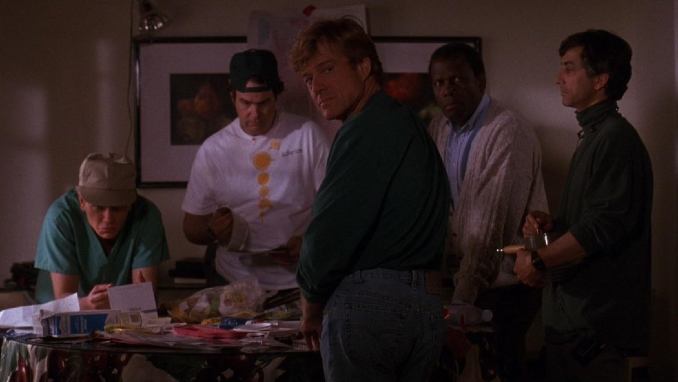How Sneakers Aged Better than Almost All Computer Thrillers

Movies about computers and, later, the internet are notoriously inaccurate, and computer people, especially on the internet, are notoriously fussy about those inaccuracies. We all kind of hate the internet, yet most of us maintain a sibling-like defensiveness about movies that dare depict it, especially when bathed in the negative light most of us can plainly see (at least if we’re on social media). Internet paranoia thrillers of the mid-’90s are now largely regarded as kitsch; internet paranoia dramas of a more recent vintage are derided as fusty.
So it’s especially remarkable that one of the most beloved computer-shenanigans movies came out even earlier than the 1995 internet-movie boom, and stars a bunch of bonafide old guys to boot. This month Sneakers celebrates its 30th birthday, which means it’s still younger than most of its stars at time of release. Above-the-title billing goes to Robert Redford, then in his late 50s. He’s backed up by the legendary Sidney Poitier, then in his mid-60s; Dan Aykroyd and David Strathairn, in their 40s; and the one young buck, a 22-year-old River Phoenix, who would be gone too soon just a little over a year after the movie’s release.
Phoenix’s character Carl isn’t even the hotshot computer expert in the crew, a group of misfits with shady pasts who make a business out of testing banks’ security systems by attempting high-tech break-ins. (Carl’s most crucial contribution: Jumping through a drop ceiling to disarm a bad guy.) That this business is considered sort of shady is something that sticks out decades later: When Redford’s Martin Bishop remarks “it’s a living” about his unusual line of work, the woman writing his paycheck rejoins “Not a very good one.” In 2022, this seems more likely to be an expensive boutique operation, maybe even in spite of its semi-disgraced, criminal-adjacent employees. Of course, the reason that the firm in Sneakers is depicted as ramshackle is the same reason the movie holds up without seeming hopelessly, Hackers-level dated: Much of it is an analog caper, on the cusp of digital transformation.
That caper involves Bishop and his group getting hired by the NSA to retrieve a black box, only to realize they’ve actually handed it over to Cosmo (Ben Kingsley, doing what can only be described as some kind of an accent), an old college friend of Bishop from his radical days. Cosmo has his sights on the box’s ability to universally decrypt any computer system, though his plan for world destruction seems oddly low-key: He tells Bishop about his intention to crash the world’s financial systems, then frames him for murder and has him tossed back on the street. (No real rush on this revolution, it seems.) The team then makes a deal with the actual NSA to retrieve the box in order to clear Bishop’s name. There’s a kind of generic, default faith in the U.S. government to do, if not exactly the right thing, nothing so evil as Cosmo’s dastardly plan to create economic equality.
- Curated Home Page Articles By Test Admin October 21, 2025 | 3:10pm
-

- Curated Home Page Articles By Test Admin October 21, 2025 | 2:57pm
- Urls By Test Admin October 21, 2025 | 2:57pm
- Curated Home Page Articles By Test Admin October 21, 2025 | 2:55pm
-

-

-

-

-

-

-

-

-

-

-

-

-

-

-

-

-

-

-

-

-

-

-

-

-

-

-

-

-

-

-

-

-

-

-




































